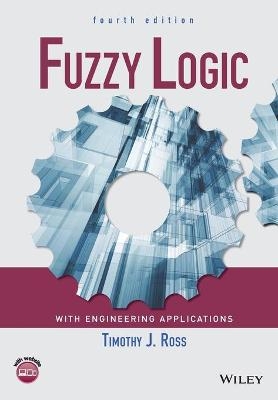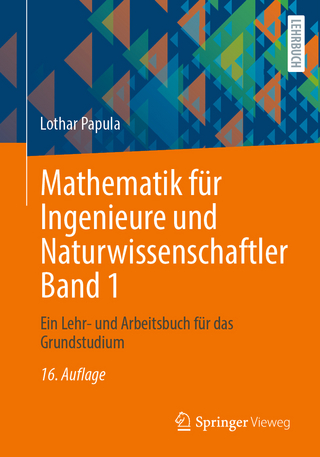
Fuzzy Logic with Engineering Applications
John Wiley & Sons Inc (Verlag)
978-1-119-23586-6 (ISBN)
Explore the diverse electrical engineering application of polymer composite materials with this in-depth collection edited by leaders in the field
Polymer Composites for Electrical Engineering delivers a comprehensive exploration of the fundamental principles, state-of-the-art research, and future challenges of polymer composites. Written from the perspective of electrical engineering applications, like electrical and thermal energy storage, high temperature applications, fire retardance, power cables, electric stress control, and others, the book covers all major application branches of these widely used materials.
Rather than focus on polymer composite materials themselves, the distinguished editors have chosen to collect contributions from industry leaders in the area of real and practical electrical engineering applications of polymer composites. The book�s relevance will only increase as advanced polymer composites receive more attention and interest in the area of advanced electronic devices and electric power equipment.
Unique amongst its peers, Polymer Composites for Electrical Engineering offers readers a collection of practical and insightful materials that will be of great interest to both academic and industrial audiences. Those resources include:
A comprehensive discussion of glass fiber reinforced polymer composites for power equipment, including GIS, bushing, transformers, and more)
Explorations of polymer composites for capacitors, outdoor insulation, electric stress control, power cable insulation, electrical and thermal energy storage, and high temperature applications
A treatment of semi-conductive polymer composites for power cables
In-depth analysis of fire-retardant polymer composites for electrical engineering
An examination of polymer composite conductors Perfect for postgraduate students and researchers working in the fields of electrical, electronic, and polymer engineering, Polymer Composites for Electrical Engineering will also earn a place in the libraries of those working in the areas of composite materials, energy science and technology, and nanotechnology.
Timothy J. Ross, University of New Mexico, USA Dr. Ross is a professor within the Department of Civil Engineering at the University of New Mexico where he teaches courses in structural analysis, structural dynamics and fuzzy logic. He is a registered professional engineer with over 30 years’ experience in the fields of computational mechanics, hazard survivability, structural dynamics, structural safety, stochastic processes, risk assessment, and fuzzy systems. He is also the founding Editor-in-Chief of the International Journal, Intelligent and Fuzzy Systems.
About the Author xi
Preface to the Fourth Edition xiii
1 Introduction 1
The Case for Imprecision 2
A Historical Perspective 4
The Utility of Fuzzy Systems 7
Limitations of Fuzzy Systems 9
The Illusion: Ignoring Uncertainty and Accuracy 11
Uncertainty and Information 13
Fuzzy Sets and Membership 14
Chance versus Fuzziness 17
Intuition of Uncertainty: Fuzzy versus Probability 19
Sets as Points in Hypercubes 21
Summary 23
References 23
Problems 24
2 Classical Sets and Fuzzy Sets 27
Classical Sets 28
Fuzzy Sets 36
Summary 45
References 46
Problems 46
3 Classical Relations and Fuzzy Relations 51
Cartesian Product 52
Crisp Relations 53
Fuzzy Relations 58
Tolerance and Equivalence Relations 67
Fuzzy Tolerance and Equivalence Relations 70
Value Assignments 72
Other Forms of the Composition Operation 76
Summary 77
References 77
Problems 77
4 Properties of Membership Functions, Fuzzification, and Defuzzification 84
Features of the Membership Function 85
Various Forms 87
Fuzzification 88
Defuzzification to Crisp Sets 90
λ-Cuts for Fuzzy Relations 92
Defuzzification to Scalars 93
Summary 102
References 103
Problems 104
5 Logic and Fuzzy Systems 107
Part I: Logic 107
Classical Logic 108
Fuzzy Logic 122
Part II: Fuzzy Systems 132
Summary 151
References 153
Problems 154
6 Historical Methods of Developing Membership Functions 163
Membership Value Assignments 164
Intuition 164
Inference 165
Rank Ordering 167
Neural Networks 168
Genetic Algorithms 179
Inductive Reasoning 188
Summary 195
References 196
Problems 197
7 Automated Methods for Fuzzy Systems 201
Definitions 202
Batch Least Squares Algorithm 205
Recursive Least Squares Algorithm 210
Gradient Method 213
Clustering Method 218
Learning from Examples 221
Modified Learning from Examples 224
Summary 233
References 235
Problems 235
8 Fuzzy Systems Simulation 237
Fuzzy Relational Equations 242
Nonlinear Simulation Using Fuzzy Systems 243
Fuzzy Associative Memories (FAMs) 246
Summary 257
References 258
Problems 259
9 Decision Making with Fuzzy Information 265
Fuzzy Synthetic Evaluation 267
Fuzzy Ordering 269
Nontransitive Ranking 272
Preference and Consensus 275
Multiobjective Decision Making 279
Fuzzy Bayesian Decision Method 285
Decision Making under Fuzzy States and Fuzzy Actions 295
Summary 309
References 310
Problems 311
10 Fuzzy Classification and Pattern Recognition 323
Fuzzy Classification 324
Classification by Equivalence Relations 324
Cluster Analysis 332
Cluster Validity 332
c-Means Clustering 333
Hard c-Means (HCM) 333
Fuzzy c-Means (FCM) 343
Classification Metric 351
Hardening the Fuzzy c-Partition 354
Similarity Relations from Clustering 356
Fuzzy Pattern Recognition 357
Single-Sample Identification 357
Multifeature Pattern Recognition 365
Summary 378
References 379
Problems 380
11 Fuzzy Control Systems 388
Control System Design Problem 390
Examples of Fuzzy Control System Design 393
Fuzzy Engineering Process Control 404
Fuzzy Statistical Process Control 417
Industrial Applications 431
Summary 434
References 437
Problems 438
12 Applications of Fuzzy Systems Using Miscellaneous Models 455
Fuzzy Optimization 455
Fuzzy Cognitive Mapping 462
Agent-Based Models 477
Fuzzy Arithmetic and the Extension Principle 481
Fuzzy Algebra 487
Data Fusion 491
Summary 498
References 498
Problems 500
13 Monotone Measures: Belief, Plausibility, Probability, and Possibility 505
Monotone Measures 506
Belief and Plausibility 507
Evidence Theory 512
Probability Measures 515
Possibility and Necessity Measures 517
Possibility Distributions as Fuzzy Sets 525
Possibility Distributions Derived from Empirical Intervals 528
Summary 548
References 549
Problems 550
Index 554
| Erscheinungsdatum | 08.11.2016 |
|---|---|
| Verlagsort | New York |
| Sprache | englisch |
| Maße | 170 x 244 mm |
| Gewicht | 998 g |
| Themenwelt | Mathematik / Informatik ► Mathematik ► Angewandte Mathematik |
| Technik ► Elektrotechnik / Energietechnik | |
| Technik ► Maschinenbau | |
| ISBN-10 | 1-119-23586-3 / 1119235863 |
| ISBN-13 | 978-1-119-23586-6 / 9781119235866 |
| Zustand | Neuware |
| Informationen gemäß Produktsicherheitsverordnung (GPSR) | |
| Haben Sie eine Frage zum Produkt? |
aus dem Bereich


